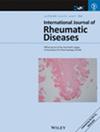The Value of Rheumatoid Arthritis Citrullinated Peptides (RACP) System in the Diagnosis of Rheumatoid Arthritis: A Retrospective Analysis of 2632 Patients
Abstract
Objectives and Aim
This study aimed to evaluate the diagnostic accuracy and prognostic value of the Rheumatoid Arthritis Citrullinated Peptides (RACP) assay in a real-world cohort, assessing its performance both independently and in combination with established biomarkers such as anti-cyclic citrullinated peptide (anti-CCP), rheumatoid factor (RF), and anti-keratin antibodies (AKA).
Methods
A single-center retrospective analysis included 2632 patients who underwent serological testing between September 2022 and September 2023. Of these, 644 patients met ACR/EULAR classification criteria for rheumatoid arthritis (RA), while 1988 patients served as non-RA controls, including an osteoarthritis (OA) subgroup. RACP, anti-CCP, RF, and AKA levels were measured by enzyme-linked immunosorbent assay (ELISA). Diagnostic sensitivity, specificity, and combination strategies were assessed using chi-square and t-tests.
Results
RACP alone demonstrated a sensitivity of 76.86% and a specificity of 89.94%, closely comparable to anti-CCP (70.87% sensitivity and 89.92% specificity). Area under the curve (AUC) values were 0.805 for RACP, 0.783 for RF, 0.799 for anti-CCP, and 0.623 for AKA. Combining RACP with RF improved sensitivity (85.36%), while dual positivity (RACP + AKA) optimized specificity (96.61%). In the OA subgroup, biomarker positivity remained minimal, confirming strong discriminatory capacity. Patients positive for RACP or anti-CCP exhibited significantly higher tender joint counts, correlating biomarker positivity with clinical disease severity.
Conclusion
RACP is a robust biomarker for RA diagnosis, offering sensitivity and specificity comparable to or exceeding traditional assays. Combinations with RF or anti-CCP enhance diagnostic accuracy, supporting its utility in early RA detection, differential diagnosis from OA, and potentially reflecting disease activity. Prospective studies are warranted to confirm these findings.

 求助内容:
求助内容: 应助结果提醒方式:
应助结果提醒方式:


